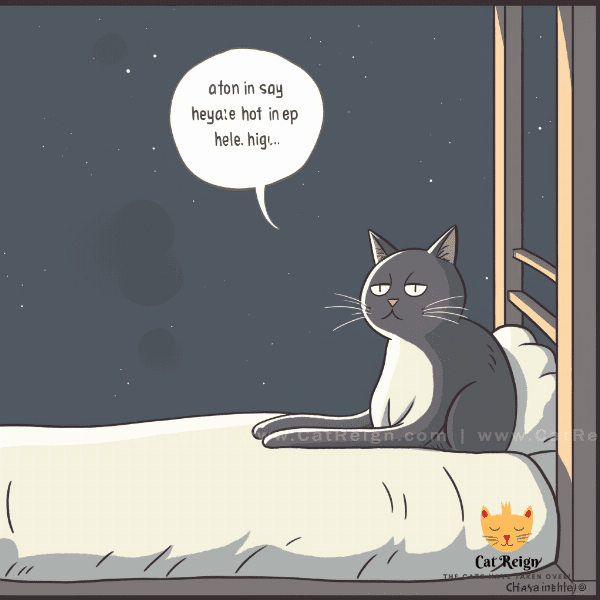Table of Contents
- Common Reasons for Nocturnal Cat Howling
- Medical Issues That May Cause Cat Howling at Night
- Understanding Your Cat’s Natural Instincts and Behaviors
- Environmental Triggers That Cause Nighttime Cat Howling
- Ways to Comfort Your Cat and Reduce Nighttime Howling
- Techniques for Training Your Cat to Stop Howling at Night
- When to Seek Professional Help for Your Cat’s Howling
- The Importance of Consistency in Managing Your Cat’s Nighttime Behavior
- Addressing Other Potential Causes of Cat Distress
- Creating a Cat-Friendly Sleep Environment to Promote Calm Nights
Common Reasons for Nocturnal Cat Howling
Cats are known to be nocturnal animals and may be more active at night. However, if your cat is howling at night, there may be an underlying issue that needs to be addressed. Here are some common reasons why your cat may be howling at night:
Attention Seeking Behavior
Cats are intelligent animals and know how to get their owners’ attention. If your cat is howling at night, it could be a way to seek attention and affection. This could be because your cat is feeling lonely, bored, or wants to play. Consider spending more quality time with your cat during the day to reduce their nighttime howling behavior.
Hunger or Thirst
Just like humans, cats need to eat and drink regularly. If your cat is howling at night, it may be a sign that they are hungry or thirsty. Ensure that your cat has access to clean water and that their food bowl is filled with nutritious food before you go to bed.
Aging and Cognitive Dysfunction
As cats age, they may develop cognitive dysfunction, which can cause confusion, disorientation, and memory loss. This can lead to increased vocalization, including howling at night. If you suspect that your cat may be suffering from cognitive dysfunction, consult with your veterinarian to find the appropriate treatment.
.
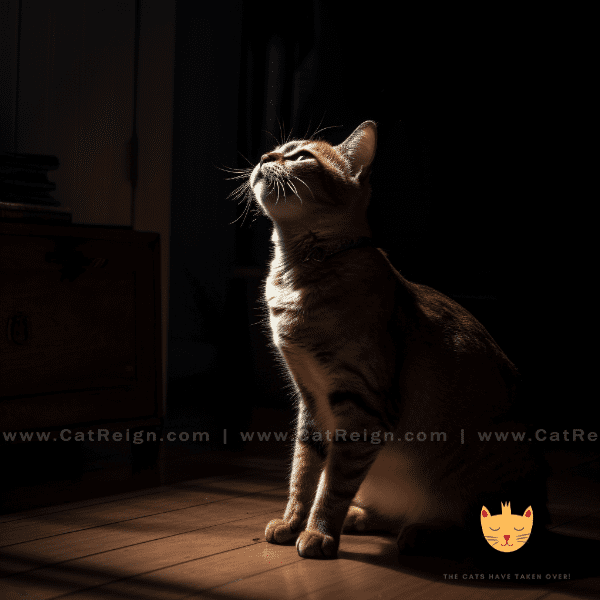
Medical Issues That May Cause Cat Howling at Night
If your cat’s howling behavior persists despite addressing the common reasons, it could be a sign of an underlying medical issue. Here are some medical conditions that may cause your cat to howl at night:
Hyperthyroidism
Hyperthyroidism is a common condition in cats, especially in older cats. It occurs when the thyroid gland produces too much thyroid hormone, which can cause an increase in metabolism and lead to excessive vocalization, including howling at night. Other symptoms of hyperthyroidism include weight loss, increased appetite, and restlessness.
Chronic Pain
Chronic pain can cause your cat to vocalize more frequently, especially at night when they are trying to sleep. Painful conditions such as arthritis, dental problems, or urinary tract infections can cause your cat to howl in discomfort. If you suspect that your cat may be in pain, it is essential to consult with a veterinarian to determine the cause of the pain and provide appropriate treatment.
Other Medical Conditions
In addition to hyperthyroidism, chronic pain, and cognitive dysfunction, other medical conditions such as hearing loss, vision loss, or neurological disorders can cause your cat to howl at night. It is essential to consult with a veterinarian to determine the underlying cause of your cat’s howling behavior and provide the appropriate treatment.
Identifying the medical conditions that may be causing your cat’s howling behavior is crucial in providing the necessary treatment and management. If you suspect that your cat may be suffering from a medical condition, it is essential to consult with a veterinarian to determine the underlying cause and provide appropriate treatment.
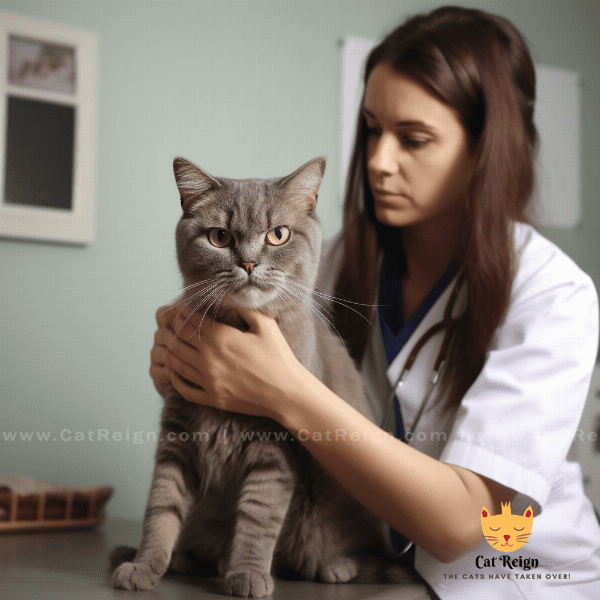
Understanding Your Cat’s Natural Instincts and Behaviors
Cats are natural hunters and are most active at night, which can lead to increased vocalization, including howling. Understanding your cat’s natural instincts and behaviors can help you manage their nighttime howling behavior. Here are some things to consider:
Nighttime Activity
Cats are crepuscular animals, which means they are most active during dawn and dusk. This is when they are naturally inclined to hunt and explore their environment. If your cat is howling at night, it could be a sign that they are feeling restless and want to engage in their natural activity of hunting. Providing your cat with toys and interactive playtime during the day can help reduce their nighttime howling behavior.
Territorial Behavior
As mentioned earlier, cats are territorial animals and may become more vocal at night when they feel the need to protect their territory. This can lead to increased howling behavior, especially if your cat senses other animals in the vicinity. Providing your cat with a safe and secure environment, such as a comfortable bed and hiding spots, can help reduce their territorial behavior and nighttime howling.
Socialization
Cats are social animals and require socialization and attention to thrive. If your cat is howling at night, it could be a sign that they are feeling lonely or isolated. Spending quality time with your cat during the day and providing them with opportunities for socialization, such as playdates with other cats, can help reduce their nighttime howling behavior.
Understanding your cat’s natural instincts and behaviors can help you identify the underlying causes of their nighttime howling behavior. By providing your cat with a comfortable and stimulating environment, socialization, and attention, you can help reduce their nighttime howling and promote a happier and healthier life for your feline friend.
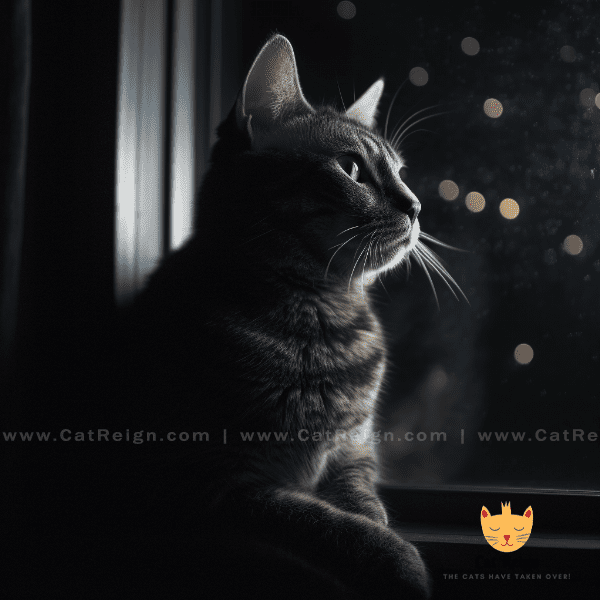
Environmental Triggers That Cause Nighttime Cat Howling
Environmental factors can also contribute to your cat’s nighttime howling behavior. Here are some environmental triggers to consider:
Noise Pollution
Loud noises or sudden sounds can startle your cat and lead to increased vocalization, including howling. Consider reducing noise pollution in your home by keeping windows and doors closed, using soundproofing materials, and avoiding loud activities or music during the night.
Changes in Routine
Cats are creatures of habit and may become distressed when their routine is disrupted. Changes in routine, such as a new work schedule or moving to a new home, can cause stress and lead to nighttime howling behavior. Providing your cat with a consistent routine and gradual adjustments can help reduce their stress and nighttime howling.
Weather Changes
Weather changes, such as thunderstorms or extreme temperatures, can also trigger your cat’s howling behavior. Ensure that your cat has access to a comfortable and safe environment during weather changes, such as a cozy bed or a room with temperature control.
Outside Stimuli
Outside stimuli, such as other animals or bright lights, can also trigger your cat’s howling behavior. Consider using curtains or blinds to reduce outside stimuli and provide your cat with a calm and peaceful sleeping environment.
Lack of Stimulation
Cats require mental and physical stimulation to thrive. A lack of stimulation can lead to boredom and restlessness, which can contribute to nighttime howling behavior. Providing your cat with toys, scratching posts, and interactive playtime during the day can help reduce their nighttime howling behavior.
Identifying the environmental triggers that may be causing your cat’s nighttime howling behavior can help you provide the appropriate adjustments and solutions to reduce their distress. By providing your cat with a comfortable and stimulating environment, minimizing noise pollution and outside stimuli, and maintaining a consistent routine, you can help reduce their nighttime howling behavior and promote a happier and healthier life for your feline friend.
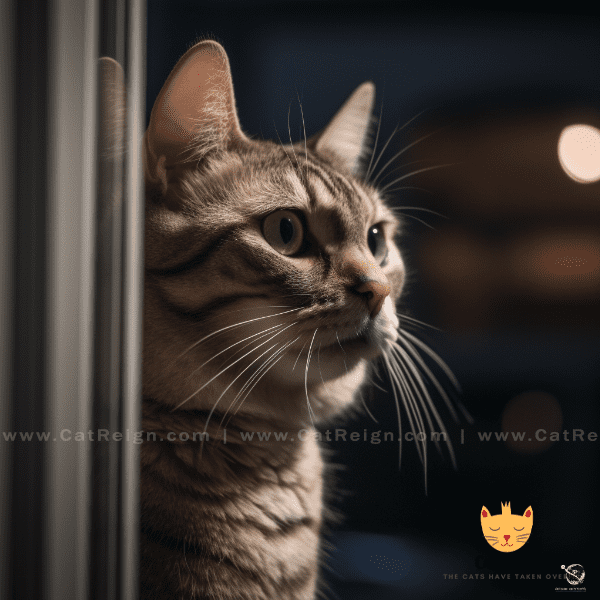
Ways to Comfort Your Cat and Reduce Nighttime Howling
If your cat is howling at night, there are several ways you can comfort them and reduce their nighttime howling behavior. Here are some tips to consider:
Provide a Comfortable Sleeping Environment
Ensuring that your cat has a comfortable and safe sleeping environment can help reduce their stress and nighttime howling behavior. Consider providing your cat with a cozy bed, soft blankets, and a hiding spot where they can feel safe and secure.
Play and Exercise During the Day
Engaging your cat in play and exercise during the day can help reduce their restlessness and nighttime howling behavior. Provide your cat with toys, scratching posts, and interactive playtime to help them expend their energy and stimulate their mind.
Maintain a Consistent Routine
Maintaining a consistent routine can help reduce your cat’s stress and anxiety, which can contribute to nighttime howling behavior. Try to feed your cat at the same time every day, provide them with a consistent playtime, and stick to a regular sleep schedule.
Spend Quality Time Together
Spending quality time with your cat during the day can help reduce their need for attention at night and reduce their nighttime howling behavior. Consider engaging in activities that your cat enjoys, such as grooming, cuddling, or playtime.
.
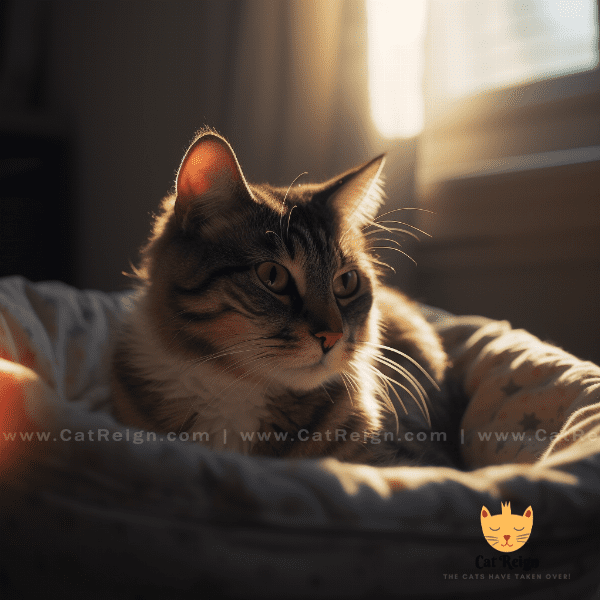
Techniques for Training Your Cat to Stop Howling at Night
Training your cat to stop howling at night requires patience and consistency. Here are some techniques to consider:
Ignore Attention-Seeking Behavior
If your cat is howling at night to seek attention, it is essential to ignore their behavior. Responding to their howling, such as getting out of bed or yelling at them, can reinforce their behavior and encourage them to continue howling. Instead, wait until your cat is quiet to give them attention and reward them for their good behavior.
Establish a Bedtime Routine
Establishing a bedtime routine can help your cat understand when it is time to sleep and reduce their nighttime howling behavior. Provide your cat with a consistent routine, such as feeding them at the same time every night and engaging them in calming activities before bedtime.
Use a Deterrent
Using a deterrent, such as a white noise machine or a motion-activated air canister, can help deter your cat from howling at night. The sudden noise can startle your cat and discourage them from vocalizing.
Provide Distraction
Providing your cat with distraction, such as puzzle toys or a scratching post, can help reduce their restlessness and nighttime howling behavior. Ensure that your cat has access to these distraction tools in their sleeping environment.
Seek Professional Help
Training your cat to stop howling at night requires consistency, patience, and understanding. By using positive reinforcement, ignoring attention-seeking behavior, establishing a bedtime routine, using a deterrent, providing distraction, and seeking professional help if necessary, you can train your cat to stop howling at night and promote a happier and healthier life for your feline friend.
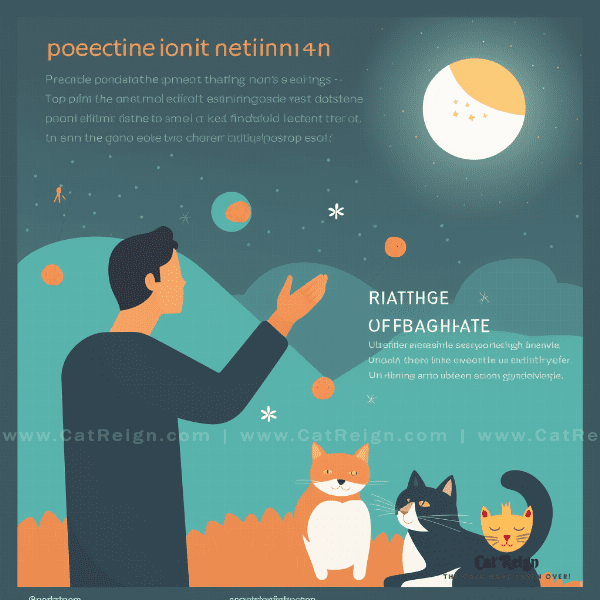
When to Seek Professional Help for Your Cat’s Howling
If your cat’s howling behavior persists despite your efforts to manage it, it may be necessary to seek professional help. Here are some signs that indicate it’s time to seek professional help for your cat’s howling behavior:
Medical Issues
If your cat’s howling behavior is accompanied by other symptoms, such as vomiting, diarrhea, or lethargy, it may be a sign of an underlying medical issue. Consult with your veterinarian to determine if there is a medical issue that needs to be addressed.
Increased Frequency and Intensity
If your cat’s howling behavior has increased in frequency and intensity, it may indicate a more severe issue that requires professional help. Consult with your veterinarian or an animal behaviorist to determine the underlying cause and provide appropriate treatment.
Aggressive Behavior
If your cat’s howling behavior is accompanied by aggressive behavior, such as biting or scratching, it is essential to seek professional help immediately. Aggressive behavior can indicate a more severe issue that requires immediate intervention.
Persistent Howling
If your cat’s howling behavior persists despite your training efforts and management techniques, it may be necessary to seek professional help. Your veterinarian or an animal behaviorist can provide additional training techniques or medication to help reduce your cat’s nighttime howling behavior.
Identifying when to seek professional help for your cat’s howling behavior is crucial in providing the appropriate treatment and management. By consulting with your veterinarian or an animal behaviorist, you can determine the underlying cause of your cat’s howling behavior and provide appropriate treatment to promote a happier and healthier life for your feline friend.

The Importance of Consistency in Managing Your Cat’s Nighttime Behavior
Consistency is essential in managing your cat’s nighttime behavior, especially when it comes to howling behavior. Here are some reasons why consistency is crucial in managing your cat’s nighttime behavior:
Establishing a Routine
Establishing a consistent routine can help your cat understand when it is time to sleep and reduce their nighttime howling behavior. Providing your cat with a consistent feeding schedule, playtime, and bedtime routine can help reduce their stress and anxiety and promote a calmer sleeping environment.
Reinforcing Positive Behavior
Consistency in reinforcing positive behavior can help your cat understand what is expected of them and encourage them to continue good behavior. When your cat is quiet and calm at night, reward them with treats, praise, or playtime. Over time, your cat will associate good behavior with positive rewards and reduce their nighttime howling behavior.
Minimizing Stress and Anxiety
Consistency in managing your cat’s nighttime behavior can help minimize stress and anxiety, which can contribute to howling behavior. Providing your cat with a comfortable and safe sleeping environment, engaging them in play and exercise during the day, and using calming techniques can help reduce their stress and anxiety and promote a calmer sleeping environment.
Promoting Bonding
Consistency in spending quality time with your cat can help promote bonding and reduce their need for attention at night. Engaging in activities that your cat enjoys, such as grooming, cuddling, or playtime, can help strengthen your relationship and reduce their nighttime howling behavior.
Consistency in managing your cat’s nighttime behavior requires patience, understanding, and commitment. By establishing a routine, reinforcing positive behavior, minimizing stress and anxiety, and promoting bonding, you can manage your cat’s nighttime howling behavior and promote a happier and healthier life for your feline friend.
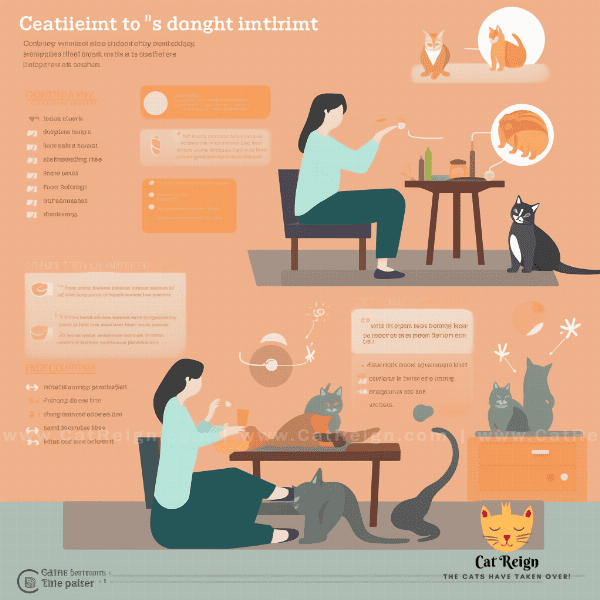
Addressing Other Potential Causes of Cat Distress
Cat distress can manifest in many ways, including howling at night. It’s essential to consider other potential causes of cat distress and address them to reduce your cat’s nighttime howling behavior. Here are some potential causes of cat distress to consider:
Separation Anxiety
Separation anxiety can occur in cats and cause distress when their owners are away. This anxiety can manifest in various ways, including howling at night. Addressing separation anxiety may involve gradually increasing the time you spend away from your cat and providing them with a comfortable and stimulating environment.
Territorial Aggression
Territorial aggression can occur in cats and cause distress when other animals or people enter their territory. This aggression can manifest in various ways, including howling at night. Addressing territorial aggression may involve providing your cat with a secure and comfortable living environment and gradually introducing them to new animals or people.
Cognitive Dysfunction
Cognitive dysfunction can occur in older cats and cause confusion and distress. This dysfunction can manifest in various ways, including howling at night. Addressing cognitive dysfunction may involve providing your cat with a comfortable and stimulating environment, providing them with regular veterinary checkups, and using medication or other therapies as recommended by your veterinarian.
Pain or Discomfort
Pain or discomfort can cause distress in cats and manifest in various ways, including howling at night. Addressing pain or discomfort may involve identifying the underlying cause, such as arthritis or dental issues, and providing appropriate treatment.
Environmental Stressors
Environmental stressors, such as changes in routine or exposure to loud noises, can cause distress in cats and manifest in various ways, including howling at night. Addressing environmental stressors may involve identifying the trigger and minimizing exposure or providing your cat with a comfortable and safe environment during the trigger event.
Identifying and addressing other potential causes of cat distress is crucial in reducing your cat’s nighttime howling behavior. By providing your cat with a comfortable and stimulating environment, addressing separation anxiety, territorial aggression, cognitive dysfunction, pain or discomfort, and environmental stressors, you can promote a happier and healthier life for your feline friend.

Creating a Cat-Friendly Sleep Environment to Promote Calm Nights
Creating a cat-friendly sleep environment can help promote calm nights for your cat and reduce their nighttime howling behavior. Here are some tips to consider:
Comfortable Sleeping Area
Ensure that your cat has a comfortable and safe sleeping area, such as a cozy bed or a hiding spot, where they can feel secure and relaxed.
Temperature Control
Maintain a comfortable temperature in your cat’s sleeping area to help them relax and sleep peacefully. Avoid exposing your cat to extreme temperatures, such as hot or cold rooms.
Light Control
Reduce exposure to bright lights or excessive light at night to promote a calmer sleeping environment. Consider using blackout curtains or dimming the lights in your cat’s sleeping area.
Noise Control
Minimize exposure to loud noises, such as traffic or music, to help reduce your cat’s stress and anxiety. Consider using white noise machines or playing calming music to promote a quieter sleeping environment.
Safe and Secure
Ensure that your cat’s sleeping environment is safe and secure to help them feel comfortable and reduce their stress and anxiety. Avoid placing your cat’s sleeping area near high-traffic areas or exposing them to potential hazards, such as cords or toxic plants.
Provide a Calming Environment
Consider using calming techniques, such as aromatherapy or pheromone diffusers, to help reduce your cat’s stress and anxiety and promote a calmer sleeping environment.
Creating a cat-friendly sleep environment requires attention to detail and consideration of your cat’s needs. By providing a comfortable sleeping area, temperature control, light control, noise control, a safe and secure environment, and a calming environment, you can promote a happier and healthier life for your feline friend and reduce their nighttime howling behavior.




